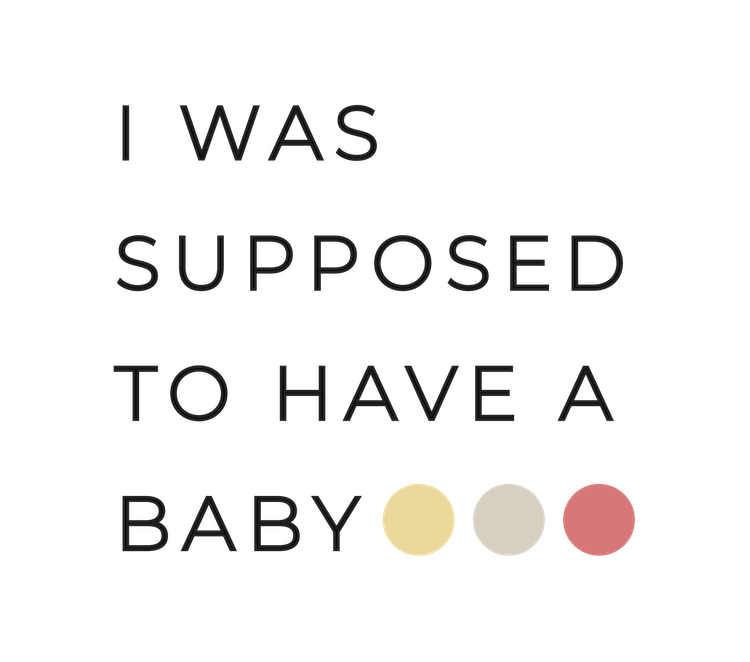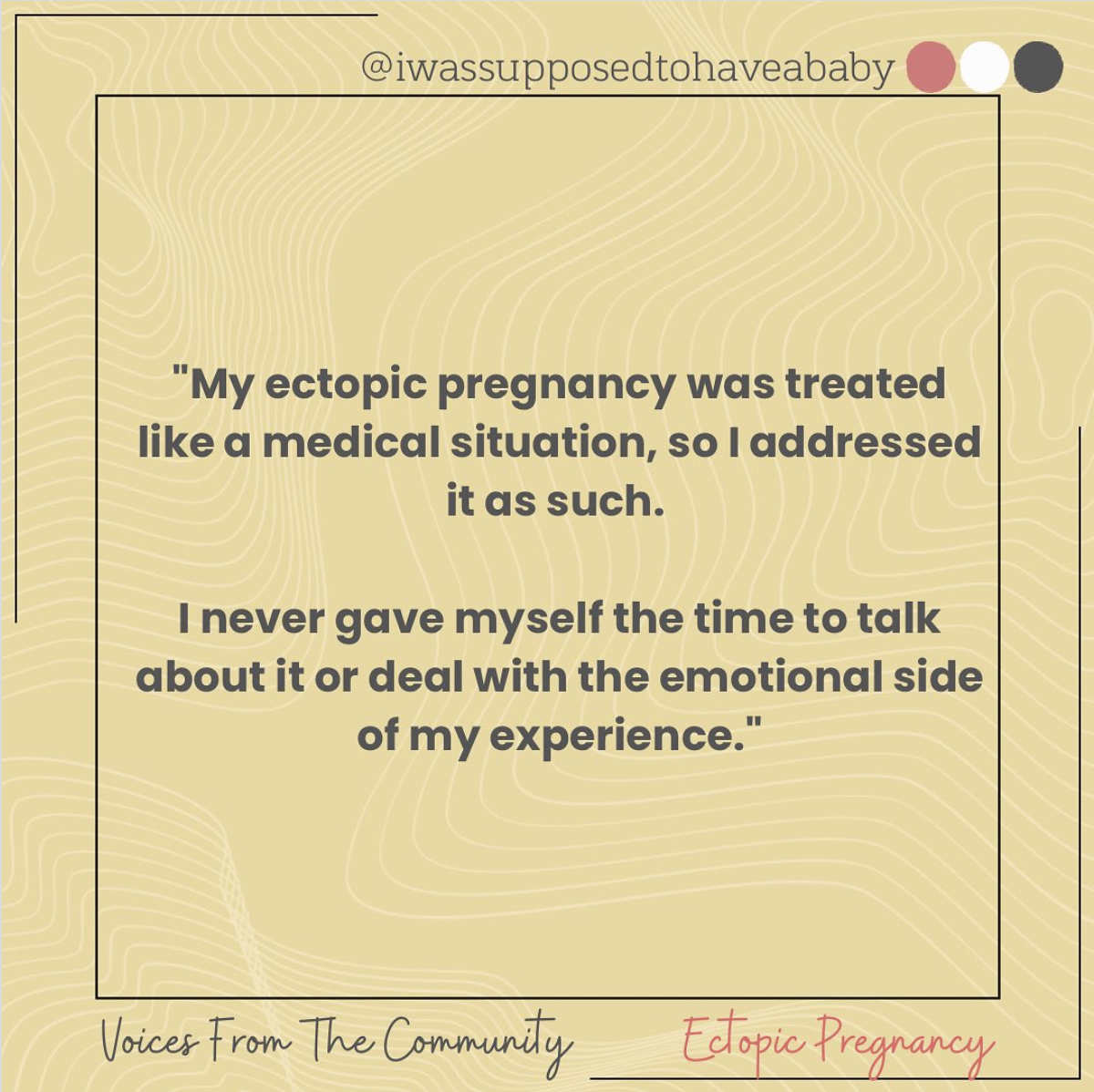Ectopic Pregnancy Loss
Here is another woman’s story of her shocking ectopic pregnancy loss and how she reflects on those events years later.
Trigger warning: this story is incredibly emotional and may be painful to read. It discusses many challenging topics such as loss, grief, relationships, and access to care but we encourage you to read it if you feel comfortable because it is so impactful and gives a glimpse into the emotions of ectopic pregnancy.
“I went to the ER with my husband early one morning, waiting till my 5-year-old son had gone off to kindergarten.
I assumed that the blinding pain that ran from my lower left quadrant down my leg toward my knee was a repeat of the intestinal infection I’d had a few years earlier.
I’m lucky to think that my local hospital is pretty darn good, a large urban teaching hospital with an outstanding reputation--so a visit to the ER was not something I feared--but at the same time, no one wants that.
I was seen pretty quickly, with a few exams, scans, and at every point, the doctors and techs kept ruling out issues and not locating the source of the pain. I was offered morphine. I said no, because whatever it was, morphine?
That was for really sick people, and I couldn’t be THAT sick.
I took the extra strength Tylenol, but nothing blunted the pain.
Then, someone asked me the hardest question.
Was there a chance that I was pregnant?
My answer? Of course not.
No way.
I was not pregnant. We had been trying for more than 3 years, since our son was 2, both naturally and with some intervention. But I wasn’t pregnant, for sure.
I hadn’t missed a period, and in fact, I had both primary infertility and secondary infertility--and I was certain the answer was a giant no. They tested me anyway. I can’t recall what kind of test--blood? urine?--but it didn’t make any difference.
Apparently, I was pregnant.
The shock still hits hard when I write this because I had no idea.
No symptoms at all, where my first pregnancy, I had every symptom from the moment I was pregnant.
And here I was.
I recall the pelvic ultrasound, the most invasive test, and yet, as someone who had been pregnant, seemingly nothing at all, no big deal.
And the results?
An ectopic pregnancy.
I barely knew what this was, but I knew enough to know that whatever it was, I wasn’t going to
be going home with a baby this time.
I was moved from behind a curtained bed into The Room.
The Room, with a closed door, filled with rape kits and a private bathroom.
For women only.
At once, I appreciated the special care. And at the same time I felt like the rest of those women were in there with me, standing by my side. I’ve never felt so lonely and so protected than when I was in that room.
The treatment option was offered: methotrexate, to stop the cells from dividing, and save my fallopian tube.
This would prevent me from the worst-case scenario of further growth and development of a non-viable fetus in a place that might explode that tube, causing me terrible pain, infection, and even worse, a hysterectomy or death (clearly, you shouldn’t consult WebMD in the ER).
If I recall, I was offered treatment in the ER or in a hospital room, and chose the ER, to speed the process.
Why wouldn’t I want to get it started, obviously?
I didn’t have time to process what was going on in my body, let alone think about moving from one space to another in a wheelchair, going up to the GYN floor, or contemplating that I might see someone with a cute little baby on the way.
Indeed, I probably was dissociating a bit.
I did not have the chance to think of myself as pregnant--there was no baby, just a clump of cells that might in fact kill me.
I took the methotrexate, that first injection, in the ER.
The second injection, after a few hours, was offered to me in a more comfortable space.
I was sent eventually to a room upstairs and took a nap. It was likely only a few hours later, but it was quiet and I slept. I remember the room felt giant and silent and I got to put my clothes back on.
The doctor who administered the injection was a woman and spoke Russian, and her eyes looked at me with the pain that I felt.
I went home with my husband.
The medical problem was fixed.
We didn’t talk about it, really.
After all, I didn’t know I was pregnant, so I wasn’t, was I?
I certainly wasn’t now.
I didn’t know how to talk about it with him. I felt horrible and so upset. I couldn’t possibly deal with his emotions.
It never occurred to me that he might have feelings about all this, too.
It turns out, some ectopic pregnancies take a long time to resolve with methotrexate treatment. I ended up needing two additional methotrexate injections, which is in some cases 3 more than is typically needed.
My pregnancy didn’t want to let go.
I spent 4 months in a limbo phase of pregnant/not pregnant, with hormones all over the place, my bloodwork showing evidence of pregnancy still before the situation was “resolved.”
Four months.
During this time, I didn’t feel like I could talk about my situation with anyone.
I wasn’t pregnant.
I hadn’t been pregnant, as far as I knew, so why would I tell anyone? What would I say?
During those four months, I went through not just a bizarre array of hormonal shockers, but a bunch of others as well.
Turns out that the state in which I live categorizes methotrexate as primarily a cancer treatment, which it is, and does not permit cancer treatments in the ER. Methotrexate is also used to treat psoriasis, rheumatoid arthritis, and a variety of other medical needs.
But for me, well, my health insurance said that my treatment was an off-label use, and since cancer treatment is not permitted in the ER, they would not cover my treatment for ectopic pregnancy in the ER.
I should have been admitted.
My second (and third and fourth) injections were covered, but not the first--no matter how much I begged--and to add insult to actual physical and emotional injury, I ended up paying out of pocket for my ectopic pregnancy treatment because my insurance would not cover it.
Still to this day, I feel the pain of that rejection, and it stings emotionally and financially. I am fortunate that I was able to afford it.
But what if I had not been able to afford it?
What would I have done?
Soon after my hormones returned to “normal,” I ended up having an argument with my parents over a family event that I had deliberately chosen to miss in the intervening months, some celebration of some family member’s birthday out of town.
I didn’t want to go, I wasn’t feeling up to it, and I didn’t want to drag my husband and son to attend.
I had not told them about my “situation,” partly because it was none of their business, and partly because I knew that I would not have a sympathetic ear.
Turns out here I was right yet again, and in that argument, I ended up sharing with my parents that I did not attend the family event in part because I was exhausted from the emotional and physical roller coaster of the treatment and follow-up (and endless doctor appointments).
My mother’s response? Whatever. People go through worse--you should have come (over and over).
My father’s response? Silence and allowing my mother to double down and continue. I’ll never forget that there was no “I’m so sorry for you” and no compassion or empathy.
And I’ll never forgive that, either.
My kindergartener is now 18.
He is an only child.
After this experience, I was truly traumatized, and my husband and I continued to try (me very halfheartedly) to get pregnant again, but at some point, I gave up.
I got lucky, as my son is an incredible human being, and I got it just right the first time, so I don’t need a whole bunch of kids. But I would have liked for him not to be an only child, and for him to have the blessings of siblings.
I could not, though.
Not after this experience.
And my husband and I do not talk about this at all.
I know that he wanted many children and that this was part of a painful narrative for him that is part of a very real loss, and I’m afraid to approach it.
It is a different kind of loss for him than it is and was for me, but nevertheless, it’s off-limits for us, and I know that it is a source of pain for him that we don’t touch.
Only later, much later, when I began to talk about my experience with ectopic pregnancy aloud and to give voice to my own pain, did I realize that I had what essentially was a medical abortion.
Something inside of me became much more confident talking about the termination of my pregnancy in that way, talking about my treatment as abortion and my right to secure that as a woman, and now, my fear that other women will not have those choices available to them as medical treatment and healthcare. In fact, it’s something that I’ve shared with my son so that he knows that abortion ends all kinds of pregnancies--accidental ones and wanted ones and even ones that are unknown and dangerous--and that it is health care that preserves the lives of mothers.
This long story comes to a close with a blush of recognition that has touched me over the years, and one that feels necessary to lift up.
My ectopic pregnancy was treated like a medical situation, so I addressed it as such.
I never gave myself the time to talk about it or deal with the emotional side of my experience.
I never stopped to think about the baby that I didn’t have--it was a bunch of cells, not a baby, and I didn’t even know I was pregnant, so I didn’t have anything to be attached to.”

